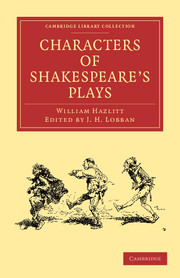Book contents
- Frontmatter
- Preface
- Contents
- Introduction
- Preface
- Cymbeline
- Macbeth
- Julius Cæsar
- Othello
- Timon of Athens
- Coriolanus
- Troilus and Cressida
- Antony and Cleopatra
- Hamlet
- The Tempest
- The Midsummer Night's Dream
- Romeo and Juliet
- Lear
- Richard II
- Henry IV
- Henry V
- Henry VI
- Richard III
- Henry VIII
- King John
- Twelfth Night; or, what you will
- The Two Gentlemen of Verona
- The Merchant of Venice
- The Winter's Tale
- All's Well That Ends Well
- Love's Labour's Lost
- Much Ado About Nothing
- As You Like It
- The Taming of the Shrew
- Measure for Measure
- The Merry Wives of Windsor
- The Comedy of Errors
- Doubtful plays of Shakespear
- Poems and Sonnets
- Notes
Henry VI
Published online by Cambridge University Press: 07 September 2010
- Frontmatter
- Preface
- Contents
- Introduction
- Preface
- Cymbeline
- Macbeth
- Julius Cæsar
- Othello
- Timon of Athens
- Coriolanus
- Troilus and Cressida
- Antony and Cleopatra
- Hamlet
- The Tempest
- The Midsummer Night's Dream
- Romeo and Juliet
- Lear
- Richard II
- Henry IV
- Henry V
- Henry VI
- Richard III
- Henry VIII
- King John
- Twelfth Night; or, what you will
- The Two Gentlemen of Verona
- The Merchant of Venice
- The Winter's Tale
- All's Well That Ends Well
- Love's Labour's Lost
- Much Ado About Nothing
- As You Like It
- The Taming of the Shrew
- Measure for Measure
- The Merry Wives of Windsor
- The Comedy of Errors
- Doubtful plays of Shakespear
- Poems and Sonnets
- Notes
Summary
IN THREE PARTS
During the time of the civil wars of York and Lancaster, England was a perfect bear-garden, and Shakespear has given us a very lively picture of the scene. The three parts of Henry VI. convey a picture of very little else ; and are inferior to the other historical plays. They have brilliant passages; but the general ground-work is comparatively poor and meagre, the style “flat and unraised.” There are few lines like the following:—
“Glory is like a circle in the water;
Which never ceaseth to enlarge itself,
Till by broad spreading it disperse to nought.”
The first part relates to the wars in France after the death of Henry V. and the story of the Maid of Orleans. She is here almost as scurvily treated as in Voltaire's Pucelle. Talbot is a very magnificent sketch: there is something as formidable in this portrait of him, as there would be in a monumental figure of him or in the sight of the armour which he wore. The scene in which he visits the Countess of Auvergne, who seeks to entrap him, is a very spirited one, and his description of his own treatment while a prisoner to the French not less remarkable.
- Type
- Chapter
- Information
- Characters of Shakespeare's Plays , pp. 163 - 170Publisher: Cambridge University PressPrint publication year: 2009First published in: 1908

